Has a problem been found?

Repair as necessary and go to "Verification of Vehicle Repair" procedure.

Go to "Signal Circuit Inspection" procedure.
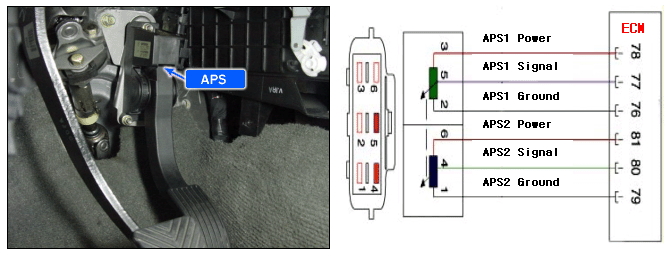
APS(Acceleration Position Sensor) is measured the driver's acceleration using a potentiometer and APS signal is transmitted to the ECM. The pedal's position is calculated from the voltage of potentiometer in the APS.
The absence of a mechanical link between the accelertor pedal and injection system presents a risk of loss of control of the engine in the event of a failure of the component in the charge of providing the driver's request information to the injection system.
Therefore, APS has the two potentiometers whose slides are mechanically solid.
APS 2 is for plausibility of load request signal and decide whether or not APS 1 & 2 is malfunctioning.
If the signal is exceeds threshold value, the ECM judged this as a fault and DTC is set.
Item | Detecting Condition | Possible Cause |
DTC Strategy | ● Signal check, high | ● Short to battery in signal circuit ● Open in signal circuit ● Open in ground circuit ● Faulty APS 2 ● Faulty ECM |
Enable Conditions | ● Ignition on | |
Threshold Value | ● Output signal > 2.464V | |
Diagnostic Time | ● 0.18 sec. | |
MIL Fuel Limit Fuel Cut EGR Off | ● Yes ● Yes ● No ● No | |
Fail safe | ● Engine speed is fixed at 1200 rpm without accel pedal sensor action. ● Engine performance is reduced. ● Air conditioning system is deactivited as against the vehicle speed and the engine rpm. ● Cruise control system inhibited |
APS | ||
Accel pedal position | Idle Position (0%) | Fully acceleration (100%) |
Signal votage | 0.2 ~ 0.5 V | 1.6 ~ 2.5 V |
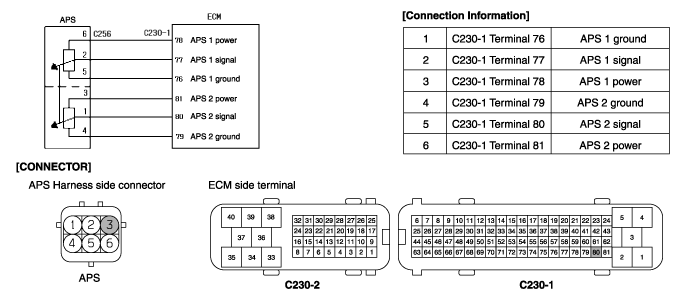
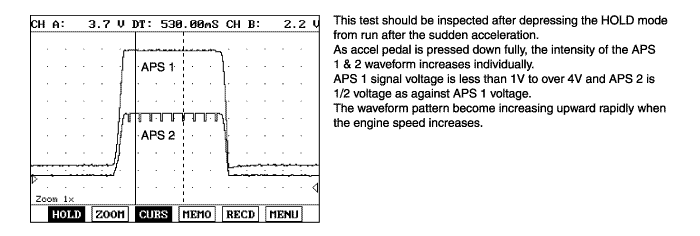
Connect scantool to Data Link Cable (DLC).
Warm up engine to normal operating temperature.
Monitor "Acceleration Position Sensor" parameter on the scantool.
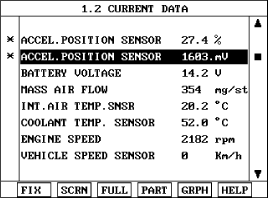
Fig 1) Signal increases when depressing accel pedal.
Is Current data displayed correctly ?

Fault is intermittent caused by poor contact in the sensor’s and/or ECM’s connector or was repaired and ECM memory was not cleared. Thoroughly check connectors for looseness, poor connection, bending, corrosion, contamination, deterioration, or damage. Repair or replace as necessary and go to "Verification of Vehicle Repair" procedure.

▶ Go to "W/Harness Inspection" procedure.
Many malfunctions in the electrical system are caused by poor harness and terminals.
Faults can also be caused by interference from other electrical systems, and mechanical or chemical damage.
Thoroughly check connectors for looseness, poor connection, bending, corrosion, contamination, deterioration, or damage.
Has a problem been found?

Repair as necessary and go to "Verification of Vehicle Repair" procedure.

Go to "Signal Circuit Inspection" procedure.
Check for short to battery in harness
Ignition "OFF".
Disconnect AP sensor connector.
Ignition "ON" & Engine "OFF".
Measure voltage between terminal 1 of the sensor harness connector and chassis ground
Specification : 4.8 ~ 5.1V
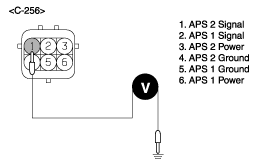
Is the measured voltage within specifications ?

▶ Go to "Check for open in harness" as below.

▶ Check for short to battery in harness. Repair as necessary and go to "Verification of Vehicle Repair" procedure.
Check for open in harness
Ignition "OFF"
Disconnect AP sensor connector
Measure resistance between terminal 1 of the sensor harness connector and terminal 80 of ECM harness connector.
Specification : Approx.below 1Ω
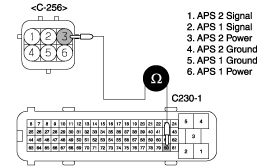
Is the measured resistance within specifications ?

▶ Go to "Ground Circuit Inspection" procedure.

▶ Check for open in harness. Repair as necessary and go to "Verification of Vehicle Repair" procedure.
Ignition "OFF".
Disconnect AP sensor connector.
Measure resistance between terminal 4 of the sensor harness connector and terminal 79 of ECM harness connector.
Specification : Approx.below 1Ω
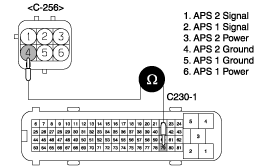
Is the measured resistance within specifications ?

▶ Go to "Component Inspection" procedure.

▶ Check for open in harness. Repair as necessary and go to "Verification of Vehicle Repair" procedure.
Check APS2
Ignition "OFF".
Disconnect APS2 connector.
Measure resistance between terminals 3 and 6 of the sensor connector(to IAT sensor side).
Specification : 1.7kΩ ± 0.8kΩ (20°C)
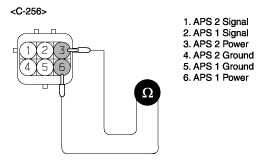
Is the measured resistance within specifications ?

▶ Substitute with a known-good ECM and check for proper operation.
If the problem is corrected, replace ECM and then go to "Verification of Vehicle Repair" procedure.

▶ Substitute with a known-good APS2 and check for proper operation.
If the problem is corrected, replace APS2 and then go to "Verification of Vehicle Repair" procedure.
After a repair, it is essential to verify that the fault has been corrected.
Connect scan tool and select "Diagnostic Trouble Codes(DTCs)" mode and then clear DTC.
Operate the vehicle within DTC Enable conditions in General information.
Are any DTCs present ?

Go to the applicable troubleshooting procedure.

System is performing to specification at this time.